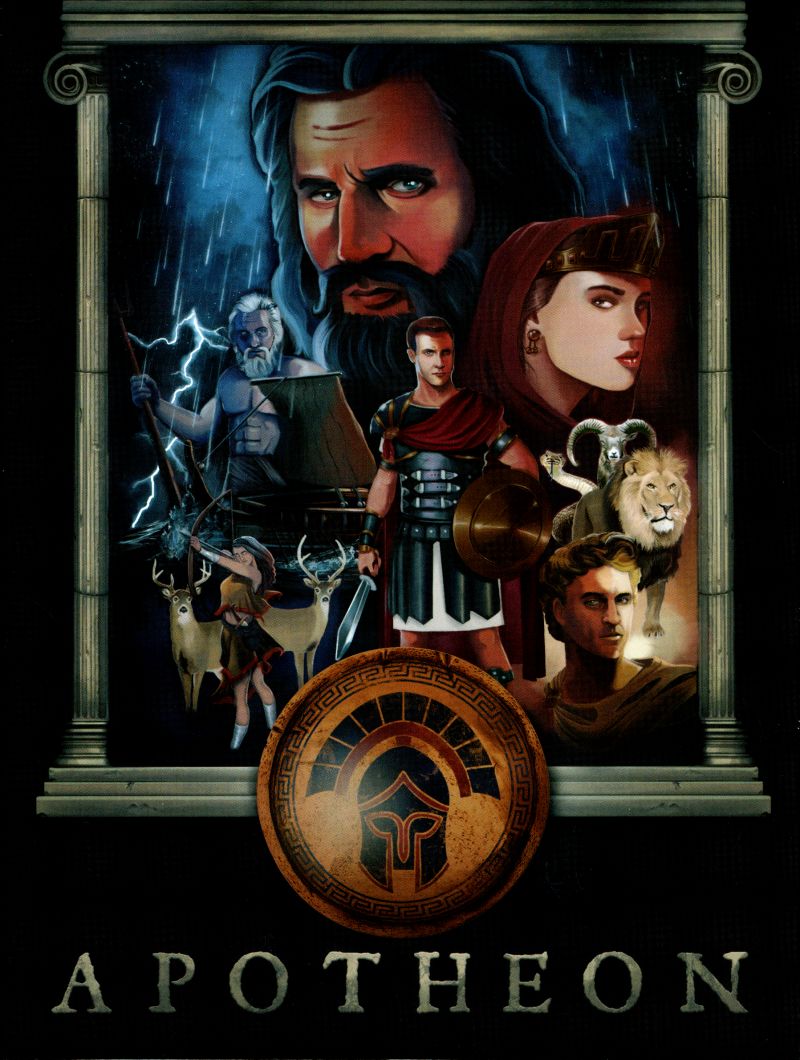Title of the work
Studio / Production Company
Country of the First Edition
Country/countries of popularity
Original Language
First Edition Date
First Edition Details
February 3, 2015
Platform
Official Website
apotheongame.com (accessed: August 13, 2018).
Available Onllne
Trailer: youtube.com (accessed: August 13, 2018).
Awards
Apotheon’s Metacritic Score for the PS4 edition was 76/100 and for PC edition was 78/100.
The soundtrack was nominated for the Best Original Music at the Canada Video Games Awards 2015, whilst the game itself has received nominations for:
- Game of the Year,
- Best downloadable game,
- Best Animation,
- Best Audio,
- Best Indie Game,
- Best Technology,
- Fans’ Choice Award: Best Canadian-Made Game.
Apotheon was acknowledged by leading gaming journalists Patrick Hancock, of Destructoid, as ‘one of the most captivating and stylish games in recent history’, giving it a 9.5/10. Other popular gaming websites and famous youtubers/gaming journalists held Apotheon in high regards such Nerd3, TotalBiscuit, and Kotaku.
Genre
Action and adventure video games*
Platform*
Target Audience
Young adults (This game was given a European rating of Pan European Game Information (PEGI) 16 and the American equivalent of ‘T’ (Teenager))
Cover

Copyright belongs to Alientrap.
Author of the Entry:
Nanci Santos,University of Roehampton, nancisantos@hotmail.co.uk
Peer-reviewer of the Entry:
Susan Deacy, University of Roehampton, s.deacy@roehampton.ac.uk
Elżbieta Olechowska, University of Warsaw, elzbieta.olechowska@gmail.com

Marios Aristopoulos, under creative commons licences (accessed: July 4, 2018).
Marios Aristopoulos (Musician)
Marios Aristopoulos is a musician based in London. He studied at Goldsmiths College and SOAS, University of London. He was the music composer for the game Apotheon, where he heavily used Ancient Greek influences in order to make the ambient music throughout the game as authentic as possible. Other works include music composer for the 3D Greek short video animation Aenigma. This was released in Greece in September 2016 by the production companies Authorwave, Steficon SA, and T-short. Trailer available here (accessed: July 4, 2018). Aristopoulos has also created a track for a modification for the video game Halo named Sins of the Prophets: Antimatter. This mod, made by Slugfest Studios, is yet to be released. The song can be accessed on his personal blog (accessed: July 4, 2018).
Bio prepared by Nanci Santos, University of Roehampton, nancisantos@hotmail.co.uk

Jesse McGibney (Illustrator)
Jesse McGibney is an illustrator based in Toronto in Canada. He is the Co-Founder and Creative Director at Alientrap. He can be found on Twitter (accessed: August 13, 2017) and on his own website (accessed: August 13, 2017).
Bio prepared by Nanci Santos, University of Roehampton, nancisantos@hotmail.co.uk

Maciej Paprocki, under creative commons licences (accessed: June 26, 2018).
Maciej Paprocki (Scriptwriter)
Maciej Paprocki was the writer and researcher for Apotheon. He is a Postdoctoral Fellow in the Distant Worlds Graduate School, where he examines depictions of political tensions between the families of Zeus and Hyperion in Ancient Greek Literature. He holds a BA in Classics/Mediterranean Culture and a MA in English Studies. He applies a Structuralist Analysis of Greek myth founded on the work of Jean-Pierre Vernant, Deborah Lyons and Jenny Strauss Clay (see here, accessed: May 22, 2018).
Bio prepared by Nanci Santos, University of Roehampton, nancisantos@hotmail.co.uk

Lee Vermeulen (Producer)
Lee Vermeulen is a video games developer, Virtual Reality (VR) developer and programmer from Saskatoon in Canada. He is the Co-Founder of the developer and publisher Alientrap. He can be found on Twitter (accessed: August 13, 2017) and on his own website (accessed: August 13, 2017).
Bio prepared by Nanci Santos, University of Roehampton, nancisantos@hotmail.co.uk
Summary
Apotheon features the story of Nikandreos, a warrior from the village of Dion, and his journey to save his village and the Earth from the wrath of Zeus. The story begins with the ransack of Dion by invaders. Nikandreos saves his village alongside surviving soldiers and then heads to the temple, where Hera congratulates him for defeating the invaders and recruits him as her champion to take down Zeus, in revenge for her husband’s affairs with other gods and humans. He agrees to this task and ascends to Mount Olympus where he begins his journey. He must first obtain gifts from the gods so that the Earth may regain its natural resources, as their absence is gradually destroying the Earth. However, as he begins to gather these, Zeus’ anger grows and he orders the gods to create more havoc and destruction upon the mortals, thus meaning Zeus must be defeated to prevent the end of the human race. Nikandreos carries out this task ultimately becoming god-like himself, achieving Apotheosis as humanity enters the Iron Age.
Analysis
Apotheon is one of the best examples of Greek Antiquity inspired video games. The story itself occurs in Ancient Greece with quotes inscribed in stones, throughout the game, from:
- Aeschylus Eumenides, Fragment 282, Prometheus Bound
- Apollonius Rhodius Argonautica
- Callimachus Hymn 6 to Demeter
- Euripides Bacchae; Alcestis
- Heraclitus
- Hesiod Theogony
- Homer Iliad; Odyssey
- Homeric Hymns Hymn 2 to Demeter
- Homeric Hymns Hymn 3 to Delian Apollo
- Homeric Hymns Hymn 5 to Aphrodite
- Homeric Hymns Hymn 18 to Hermes
- Homeric Hymns Hymn 22 to Poseidon
- Homeric Hymns Hymn 28 to Athena
- Homeric Hymns Hymn 31 to Helios
- Nonnus Dionysiaca
- Oppian On Hunting (Cynegetica)
- Orphic Hymns Hymn 87 to Thanatos
- Orphic Hymns Hymn 39 to Demeter
- Pausanias Description of Greece
- Philestratus the Elder Imagines
- Plato Protagoras
- Pseudo-Apollodorus Bibliotheca
- Pseudo-Hygenius Fabulae 203
- Valerius Flaccus Argonautica
The weapons and items found throughout the game are filled with references to Ancient Greek weaponry including the Xiphos sword, the Kopis sword and the famous Doru spear but also include mythical weaponry such as Artemis’ bow, Thunderbolts and Tridents. The ambient music in the background throughout the game prominently features a lyre. (The soundtrack is available to listen here, accessed: August 13, 2017).
In an interview with the ‘Nerdy Show Live’ during the 2014 Electronic Entertainment Expo (E3), Co-Founder Lee Vermeulen explained the game originally began as sci-fi game which would include ‘Greeks in Space’ but later decided to go with the Greek Black-figure pottery aesthetic. (This idea may be revisited in future, Polygon have further elaborated this in their interview with the creators at the PAX Prime 2013)
There is a lack of references made to geographical locations other than Mount Olympus and the village of Dion, as the story is mostly set in Olympus, the home of the Gods. The style of the game borrows its design from black figure pottery with references to various well-known sculptures such as the Discobolus of Myron and Zeus at Olympia. It also includes a wide range of mythical creatures such as the Bacchae, Nymphs, Satyrs, and Chimaeras, and various famous mythical persons such as Diomedes. There are three main hub areas: The Olympian Gate, the Agora and the Acropolis, as well as seven main stages, featuring Artemis, Apollo, Demeter (followed by a stage in the realm of Persephone and Hades), Ares, Athena, and Poseidon. Each of these stages is themed according to each god, and therefore the Artemis stage occurs in a forest, whereas the one with Poseidon happens at sea. Athena’s stage is set in a complex maze system which the player must overcome before she allows the player in her domain. There are other side missions in which the player meets the remaining Olympian gods: Hephaestus, Hermes, Dionysus, and Aphrodite. Completing these missions gives extra items related to each god.
The game itself tells the story of a warrior who later becomes a hero, alluding to the Greek ‘heroic quest’. As Nikandreos reaches closer to Zeus, the game begins to quote Hesiod’s Work and Days (lines 109-195), giving the story a chronology and offering a clever explanation to how humans entered the so-called fourth and final stage: the Greek ‘Iron Age’.
The game further alludes to the ancient Greek concept of hubris at the beginning of the game, although only explains this towards the end of the game. In a cutscene before the final battle of the game, Zeus explains that he grew tired of how humanity behaved, with its arrogance and bad attitude towards the gods and thus decided to punish them at first by famine and destruction, before deciding to end humanity altogether.
Apotheon was created with the intention of recreating the art in classical pottery as a video game. Its story explores various ancient Greek themes, including heroic deeds, the different eras of humanity, and the relationship between humans and gods. It also includes the elevation of the protagonist to a god-like status, as is observed with the very final ‘battle’. This ‘Apotheosis’ is what gives the game its name of Apotheon.
Further Reading
Hancock, Patrick, "Review: Apotheon", Destructoid, February, 2015 (accessed: August 15, 2018).
McWhertor, Michael, "Apotheon's ancient pottery adventure is a gift from the space Greeks", Polygon, September, 2013 (accessed: August 15, 2018).
Nerd3.,Nerd3 FW: Apotheon, YouTube. February, 2015 (accessed: August 15, 2018).
Nerdy Show Live, "Apotheon – Classical Grecian Sidescroller: E3 2014 Developer Interview", YouTube. June, 2014 (accessed: August 15, 2018).
Nevin, Sonya and Steve Simons, Game On! A Panoply Interview with Apotheon Advisor Dr Maciej Paprocki, http://panoplyclassicsandanimation.blogspot.com, published September 20, 2017 (accessed: January 11, 2021).
Plouffe, Nicholas, "Apotheon Review – The ‘God of War’ 2D Beat-em-up… But Nikandrios is no Kratos", Canadian Online Gamers (COG), February, 2015 (accessed: August 13, 2018).
Starkey, Daniel, "Apotheon Review – What’s a god to a non-believer?", Gamespot, February, 2015 (accessed: August 20, 2018).
TotalBiscuit, "Apotheon – An Artsy Ancient Greek Action-RPG", YouTube, April, 2013 (accessed: August 15, 2018).
Totilo, Stephen, "Current Obsession: Apotheon, A Metroid On Mt. Olympus That's A Tad NSFW", Kotaku, September, 2015 (accessed: August 15, 2018).
Addenda
Apotheon was created, developed, and published by Alientrap (2002 – Present), who also created Cryptark, Modbox and Capsized. Co-founded by Lee Vermeulen and Jesse McGibney in 2002, Alientrap are a video games development company, who also publish some of their own games. The team includes the Co-Founders Lee Vermeulen as Lead programmer and Jesse McGibney as Art and Creative Director, Marios Aristopoulos as the musician, and Maciej Paprocki as the writer and consultant, amongst others.
Genre: Apotheon is a 2D action role-playing game, in the same style as the popular ‘Metroidvania’ genre. (Plouffe, N. 2015). This game was given a European rating of Pan European Game Information (PEGI) 16 and the American equivalent of ‘T’ (Teenager), thus showing its intended audience as being a more mature audience consisting of young adults, teenagers, and adults due to the violence and traditional Ancient Greek nudity, present in Classical statues, throughout the game.


